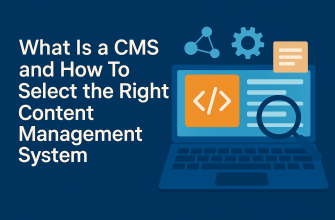Managing a WordPress website can quickly become overwhelming with repetitive tasks like publishing content, sending emails, launching campaigns, and maintaining site security. That’s where WordPress automation comes in. By streamlining workflows and eliminating manual processes, automation boosts efficiency, saves time, and reduces errors.
From email marketing to backups and even social media sharing, automation helps website owners focus on growth and delivering a seamless user experience.
- Quick Insights
- What is WordPress Automation?
- Best WordPress Automation Tools (2025)
- Time-Saving Automation Ideas for WordPress
- 1. Auto-Publish Content (Drip Scheduling)
- 2. Automated Content Updates
- 3. Automatic Backups & Security Scans
- 4. Form Submission Alerts
- 5. Image Optimization on Upload
- 6. Welcome Emails for New Users
- 7. Auto-Share on Social Media
- 8. CRM Syncing
- 9. Theme & Plugin Auto-Updates
- 10. RSS-Based Email Campaigns
- 11. Downtime Monitoring Alerts
- Why You Should Automate Your WordPress Site
- Final Thoughts
- FAQs About WordPress Automation
Quick Insights
- Save up to 15+ hours/month with automated content, email, and backup tasks.
- Reduce plugin conflicts by 40% through automated updates.
- Improve publishing consistency by 20–25% using content scheduling tools.
What is WordPress Automation?
WordPress automation involves using plugins and tools to create smart workflows that handle recurring or complex tasks without manual input.
- Trigger: An event that starts a process (e.g., a user registering).
- Action: The automated response (e.g., sending a welcome email).
Best WordPress Automation Tools (2025)
| Tool | Pricing (USD) | Use Case |
|---|---|---|
| UpdraftPlus | Free / Premium from $70/year | Backups, restoration, migration |
| BlogVault | From $149/year | Real-time backups, migrations |
| Sucuri | From $229/year | Security & malware removal |
| MemberPress | From $179.50/year | Content dripping, memberships |
| WPForms | From $49.50/year | Forms & automation |
| Uncanny Automator | Free / Pro from $149/year | Connects plugins, automates workflows |
| Mailchimp | From $10/month | Email automation |
| ShortPixel | From $9/month | Image compression |
| FluentCRM | From $103/year | Email CRM inside WordPress |
| Social Media Auto Publish | Free | Auto-post to social media |
| WP Fusion | Free / Pro from $297 | CRM integration |
Time-Saving Automation Ideas for WordPress
1. Auto-Publish Content (Drip Scheduling)
Keep your audience engaged by scheduling content releases over time. Ideal for course modules or membership updates.
Tools: MemberPress, LearnDash
2. Automated Content Updates
Schedule metadata tweaks, headline changes, or seasonal offers in advance.
Tools: WP Scheduled Posts, ClickUp, Uncanny Automator
3. Automatic Backups & Security Scans
Regularly back up your site and scan for malware without lifting a finger.
Tools: UpdraftPlus, BlogVault, Sucuri
4. Form Submission Alerts
Send instant notifications to team members when key forms are submitted.
Tools: WPForms, Ninja Forms, Slack, Twilio
5. Image Optimization on Upload
Automatically compress images for better load times and SEO.
Tools: ShortPixel, Smush, Imagify
6. Welcome Emails for New Users
Make a great first impression by automating personalized welcome messages.
Tools: FluentCRM, Mailchimp, Uncanny Automator
7. Auto-Share on Social Media
Share posts instantly on Facebook, Instagram, or Twitter.
Tools: WP to Buffer, Jetpack, Smash Balloon
8. CRM Syncing
Automatically sync user behavior with your CRM for smarter targeting.
Tools: WP Fusion, HubSpot, Groundhogg
9. Theme & Plugin Auto-Updates
Reduce downtime and enhance security by auto-updating site components.
Tools: Jetpack, MainWP, ManageWP Worker
10. RSS-Based Email Campaigns
Send automated newsletters whenever you publish new blog posts.
Tools: Mailchimp, ConvertKit, MailerLite
11. Downtime Monitoring Alerts
Receive alerts the moment your site goes offline.
Tools: Uptime Robot, Jetpack, Better Uptime
Why You Should Automate Your WordPress Site
- Save Time: Free up hours each week by automating repetitive work.
- Minimize Errors: Ensure consistent execution of tasks.
- Boost Efficiency: Run your operations with fewer resources.
- Scale Smarter: Manage growth without added workload.
- Enhance SEO & Marketing: Stay consistent with campaigns and content.
- Improve Security: Stay protected with automated scans and backups.
- Support Decisions: Use automation-integrated analytics for insights.
Final Thoughts
Running a WordPress site doesn’t need to be time-consuming. By automating essential workflows like backups, spam filtering, link checking, or newsletters, you improve site performance and reliability. Tools like Akismet, WP-Optimize, and Broken Link Checker help automate crucial maintenance tasks, so you can focus on growth.
FAQs About WordPress Automation
Q1. Why automate my WordPress site?
To save time, reduce mistakes, and stay focused on high-value activities.
Q2. Can automation break my site?
If misconfigured, yes. Always test workflows and use trusted tools.
Q3. Can WooCommerce be automated?
Yes, automate order alerts, coupons, and abandoned cart emails.
Q4. Do I need to code?
No. Most tools use user-friendly interfaces with drag-and-drop or trigger-action setups.









